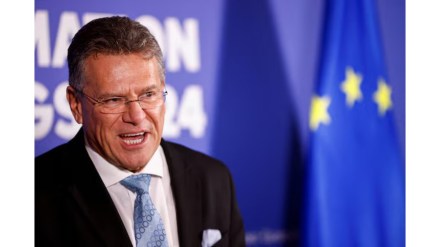Maros Sefcovic, European Commissioner for Trade, said on Monday that European Union member states have agreed to prepare for retaliatory measures against the United States. The statement from the EU chief comes after a meeting with EU ministers in Brussels, with the possibility that ongoing trade negotiations fail to avert a tariff threat from Washington.
“A 30% tariff rate would make it almost impossible to continue trading as before, with enormous consequences for supply chains and negative impacts on both sides of the Atlantic,” Sefcovic stated, emphasising the urgency to prevent this “super-negative scenario.”
US President Donald Trump announced on Saturday his intention to impose a 30% tariff on most EU imports starting August 1. European Trade Commissioner Maros Sefcovic said he had sensed that talks with U.S. counterparts were approaching “a good outcome for both sides” but the new tariff threat had created “a new dynamic”.
Despite Trump’s direct threat, Sefcovic expressed a belief in the “potential to continue the negotiations” and confirmed plans to speak with his US counterparts later today. However, he stressed the need for the EU to be ready for all outcomes, including potential countermeasures.
The European Commission had initially proposed suspending its first package of potential tariffs on €21 billion ($24.5 billion) worth of US goods, a suspension that was due to expire at midnight on Monday. The EU is now likely to seek approval for a second, more substantial package, targeting €72 billion of US goods.
Danish Foreign Minister Lars Lokke Rasmussen echoed the sentiment of cautious preparedness, stating it was “too early to impose countermeasures” but that the EU “should prepare to be ready to use all the tools.” He starkly put it: “If you want peace, you have to prepare for war. And I think that’s where we are.”
Adding a more assertive note, French Trade Minister Laurent Saint-Martin urged the EU to consider going beyond tariffs on goods, suggesting a look at targeting US services or utilizing its “anti-coercion” instrument. This powerful tool allows the bloc to retaliate against countries that exert economic pressure to influence EU policies.
“This balance of power desired by Donald Trump is a balance of power in which you must demonstrate your ability to fight back,” Saint-Martin said. “And this is perhaps where we need to accelerate today.”
(With Reuters Inputs)
